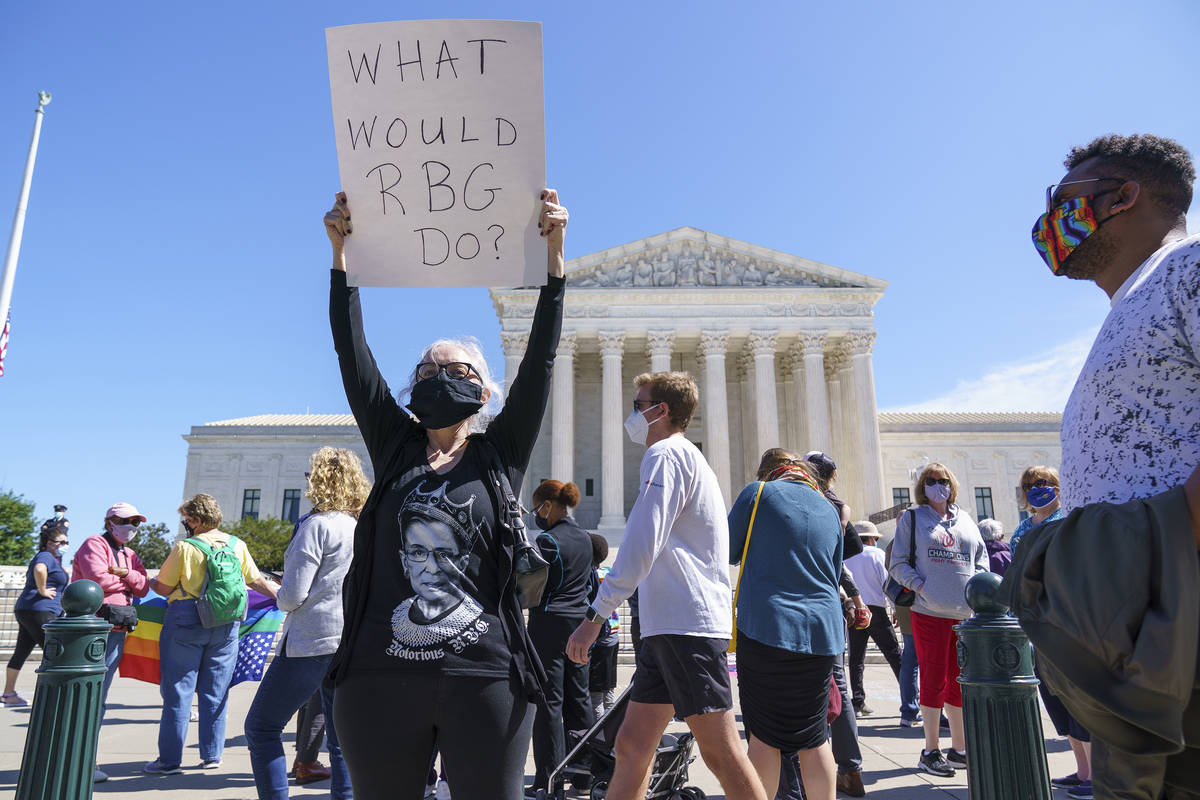CLARENCE PAGE: ‘Notorious RBG’ will be remembered for victories yet to come
I hear that Ruth Bader Ginsburg’s law clerks had to explain to her that her increasingly popular nickname, “Notorious RBG,” was a compliment.
I wish I could have been a fly on the wall as they explained the nickname’s origin in The Notorious B.I.G., the late “gangsta rap” superstar born Christopher George Latore Wallace, aka Biggie Smalls.
She became an icon. Her legal and judicial stardom fascinated us enough to bring stardom, particularly in liberal circles, that broke cultural and generational boundaries famously enough to be glorified in books, movies, T-shirts, coffee mugs, dolls and “SNL” sketches.
For many of us who were plunged into sorrow by Ginsburg’s death Friday at age 87, the “Notorious” seemed piquantly appropriate, ironic praise from her fans and vilification from her adversaries. She was famous and formidable in the nice or the not-so-nice sense, depending on which side of her legal arguments you were on.
Yet she also famously became half of Washington’s oddest couple with her ideological opposite Justice Antonin Scalia, known for being no less conservative than she was liberal. Until his death, their bonding agent was their shared love for opera, a love that was intense enough to be celebrated in a 2015 comic opera “Scalia v. Ginsburg,” sometimes known as “Scalia/Ginsburg.”
“For Ginsburg, who has been outnumbered throughout her career,” wrote Irin Carmon, co-author of “Notorious RBG: The Life and Times of Ruth Bader Ginsburg,” “it was also about making the institution work, no matter their disagreements.”
As opposing partisan sides sharpen their knives for new battles in the wake of her death, Justice Ginsburg’s successful approach to that mighty task of making the courts work offers valuable lessons for the future.
For example, revisiting Ginsburg’s views has disabused me of the popular notion that she was to women’s rights what Thurgood Marshall, a pioneer civil rights lawyer who became the high court’s first black justice, was to the rights of people of color. “When Marshall was in a Southern town, he didn’t know if he would be alive at the end of the day,” Ginsburg said in a 2017 speech. “My life was never in danger, so there’s an enormous difference.”
However, Ginsburg said, Marshall did have “a winning technique, and we copied it” when she led the Women’s Rights Project of the American Civil Liberties Union. This technique involved, she said, “leading the court where you want to go, not with giant steps but taking things one step at a time.”
Instead of directly attacking the 1896 “separate but equal” doctrine from the case of Plessy v. Ferguson as unjust in upholding the constitutionality of racial segregation, Ginsburg pointed out, Marshall waited almost 20 years for the right case in which to argue that separate facilities were simply unequal. After “building blocks” such as his successful challenge to segregated law schools in Maryland, Marshall successfully won the high court’s landmark Brown v. Board of Education decision that separate educational facilities are “inherently unequal.”
In arguing against gender discrimination before the all-male Supreme Court, Ginsburg borrowed Marshall’s technique of incremental “building blocks,” she said. She focused first on how gender discrimination hurt men. She found a good example in Weinberger v. Wiesenfeld, representing a widower who challenged a Social Security Act provision that allowed widows but not widowers to collect special benefits for the care of minor children.
As a result, Ginsburg argued, the Social Security provisions discriminated against men acting as caregivers and men acting as breadwinners. Eight justices voted in favor of the father, with one abstaining.
As part of the Supreme Court’s four-member liberal wing, as The New York Times’ Adam Liptak writes, “she did her most memorable work in dissent.” Yet, dissents sometimes prevail when reintroduced years or decades later when the social and political landscape has changed.
With that in mind, the “Notorious RBG” may well be remembered like Marshall, as a justice whose legacy of ideas means as much as the laws she helped to change. For every case she couldn’t win, she prepared the way for those who can.
Email Clarence Page at cpage@chicagotribune.com.

















